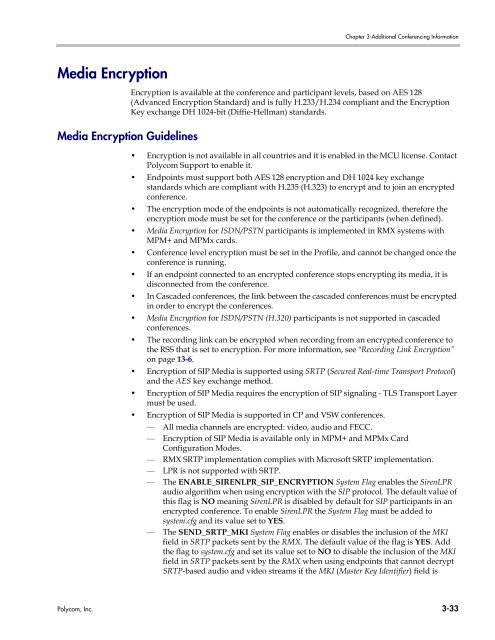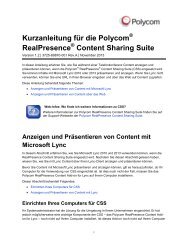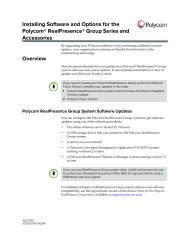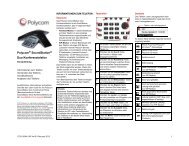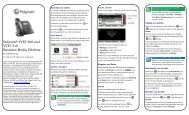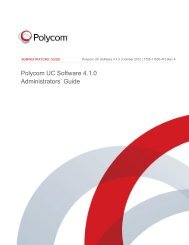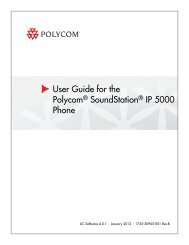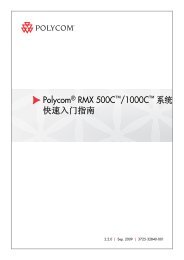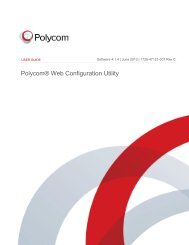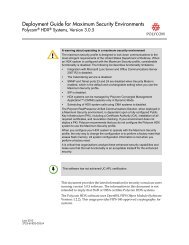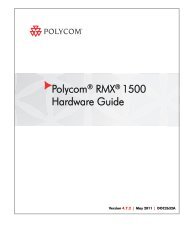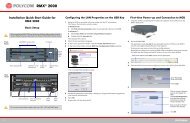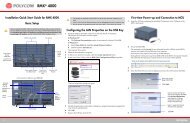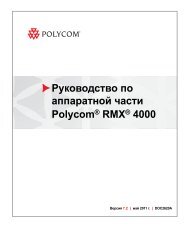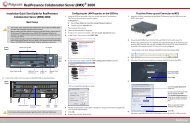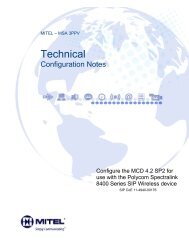- Page 1 and 2:
Polycom ® RMX ® 1500/2000/4000 Ad
- Page 3:
United States Federal Communication
- Page 6 and 7:
Polycom RMX 1500/2000/4000 Administ
- Page 8 and 9:
Polycom RMX 1500/2000/4000 Administ
- Page 10 and 11:
Polycom RMX 1500/2000/4000 Administ
- Page 12 and 13:
Polycom RMX 1500/2000/4000 Administ
- Page 14 and 15:
Polycom RMX 1500/2000/4000 Administ
- Page 16 and 17:
Polycom RMX 1500/2000/4000 Administ
- Page 18 and 19:
Polycom RMX 1500/2000/4000 Administ
- Page 20 and 21:
Polycom RMX 1500/2000/4000 Administ
- Page 22 and 23:
Polycom RMX 1500/2000/4000 Administ
- Page 24 and 25:
Polycom RMX 1500/2000/4000 Administ
- Page 26 and 27:
Polycom RMX 1500/2000/4000 Administ
- Page 28 and 29:
Polycom RMX 1500/2000/4000 Administ
- Page 30 and 31:
Polycom RMX 1500/2000/4000 Administ
- Page 32 and 33:
Polycom RMX 1500/2000/4000 Administ
- Page 34 and 35:
Polycom RMX 1500/2000/4000 Administ
- Page 36 and 37:
Polycom RMX 1500/2000/4000 Administ
- Page 38 and 39:
Polycom RMX 1500/2000/4000 Administ
- Page 40 and 41:
Polycom RMX 1500/2000/4000 Administ
- Page 42 and 43:
Polycom RMX 1500/2000/4000 Administ
- Page 44 and 45:
Polycom RMX 1500/2000/4000 Administ
- Page 46 and 47:
Polycom RMX 1500/2000/4000 Administ
- Page 48 and 49:
Polycom RMX 1500/2000/4000 Administ
- Page 50 and 51:
Polycom RMX 1500/2000/4000 Administ
- Page 52 and 53:
Polycom RMX 1500/2000/4000 Administ
- Page 54 and 55:
Polycom RMX 1500/2000/4000 Administ
- Page 56 and 57:
Polycom RMX 1500/2000/4000 Administ
- Page 58 and 59:
Polycom RMX 1500/2000/4000 Administ
- Page 60 and 61:
Polycom RMX 1500/2000/4000 Administ
- Page 62 and 63:
Polycom RMX 1500/2000/4000 Administ
- Page 64 and 65:
Polycom RMX 1500/2000/4000 Administ
- Page 66 and 67:
Polycom RMX 1500/2000/4000 Administ
- Page 68 and 69:
Polycom RMX 1500/2000/4000 Administ
- Page 70 and 71:
Polycom RMX 1500/2000/4000 Administ
- Page 72 and 73:
Polycom RMX 1500/2000/4000 Administ
- Page 74 and 75:
Polycom RMX 1500/2000/4000 Administ
- Page 76 and 77:
Polycom RMX 1500/2000/4000 Administ
- Page 78 and 79:
Polycom RMX 1500/2000/4000 Administ
- Page 80 and 81: Polycom RMX 1500/2000/4000 Administ
- Page 82 and 83: Polycom RMX 1500/2000/4000 Administ
- Page 84 and 85: Polycom RMX 1500/2000/4000 Administ
- Page 86 and 87: Polycom RMX 1500/2000/4000 Administ
- Page 88 and 89: Polycom RMX 1500/2000/4000 Administ
- Page 90 and 91: Polycom RMX 1500/2000/4000 Administ
- Page 92 and 93: Polycom RMX 1500/2000/4000 Administ
- Page 94 and 95: Polycom RMX 1500/2000/4000 Administ
- Page 96 and 97: Polycom RMX 1500/2000/4000 Administ
- Page 98 and 99: Polycom RMX 1500/2000/4000 Administ
- Page 100 and 101: Polycom RMX 1500/2000/4000 Administ
- Page 102 and 103: Polycom RMX 1500/2000/4000 Administ
- Page 104 and 105: Polycom RMX 1500/2000/4000 Administ
- Page 106 and 107: Polycom RMX 1500/2000/4000 Administ
- Page 108 and 109: Polycom RMX 1500/2000/4000 Administ
- Page 110 and 111: Polycom RMX 1500/2000/4000 Administ
- Page 112 and 113: Polycom RMX 1500/2000/4000 Administ
- Page 114 and 115: Polycom RMX 1500/2000/4000 Administ
- Page 116 and 117: Polycom RMX 1500/2000/4000 Administ
- Page 118 and 119: Polycom RMX 1500/2000/4000 Administ
- Page 120 and 121: Polycom RMX 1500/2000/4000 Administ
- Page 122 and 123: Polycom RMX 1500/2000/4000 Administ
- Page 124 and 125: Polycom RMX 1500/2000/4000 Administ
- Page 126 and 127: Polycom RMX 1500/2000/4000 Administ
- Page 128 and 129: Polycom RMX 1500/2000/4000 Administ
- Page 132 and 133: Polycom RMX 1500/2000/4000 Administ
- Page 134 and 135: Polycom RMX 1500/2000/4000 Administ
- Page 136 and 137: Polycom RMX 1500/2000/4000 Administ
- Page 138 and 139: Polycom RMX 1500/2000/4000 Administ
- Page 140 and 141: Polycom RMX 1500/2000/4000 Administ
- Page 142 and 143: Polycom RMX 1500/2000/4000 Administ
- Page 144 and 145: Polycom RMX 1500/2000/4000 Administ
- Page 146 and 147: Polycom RMX 1500/2000/4000 Administ
- Page 148 and 149: Polycom RMX 1500/2000/4000 Administ
- Page 150 and 151: Polycom RMX 1500/2000/4000 Administ
- Page 152 and 153: Polycom RMX 1500/2000/4000 Administ
- Page 154 and 155: Polycom RMX 1500/2000/4000 Administ
- Page 156 and 157: Polycom RMX 1500/2000/4000 Administ
- Page 158 and 159: Polycom RMX 1500/2000/4000 Administ
- Page 160 and 161: Polycom RMX 1500/2000/4000 Administ
- Page 162 and 163: Polycom RMX 1500/2000/4000 Administ
- Page 164 and 165: Polycom RMX 1500/2000/4000 Administ
- Page 166 and 167: Polycom RMX 1500/2000/4000 Administ
- Page 168 and 169: Polycom RMX 1500/2000/4000 Administ
- Page 170 and 171: Polycom RMX 1500/2000/4000 Administ
- Page 172 and 173: Polycom RMX 1500/2000/4000 Administ
- Page 174 and 175: Polycom RMX 1500/2000/4000 Administ
- Page 176 and 177: Polycom RMX 1500/2000/4000 Administ
- Page 178 and 179: Polycom RMX 1500/2000/4000 Administ
- Page 180 and 181:
Polycom RMX 1500/2000/4000 Administ
- Page 182 and 183:
Polycom RMX 1500/2000/4000 Administ
- Page 184 and 185:
Polycom RMX 1500/2000/4000 Administ
- Page 186 and 187:
Polycom RMX 1500/2000/4000 Administ
- Page 188 and 189:
Polycom RMX 1500/2000/4000 Administ
- Page 190 and 191:
Polycom RMX 1500/2000/4000 Administ
- Page 192 and 193:
Polycom RMX 1500/2000/4000 Administ
- Page 194 and 195:
Polycom RMX 1500/2000/4000 Administ
- Page 196 and 197:
Polycom RMX 1500/2000/4000 Administ
- Page 198 and 199:
Polycom RMX 1500/2000/4000 Administ
- Page 200 and 201:
Polycom RMX 1500/2000/4000 Administ
- Page 202 and 203:
Polycom RMX 1500/2000/4000 Administ
- Page 204 and 205:
Polycom RMX 1500/2000/4000 Administ
- Page 206 and 207:
Polycom RMX 1500/2000/4000 Administ
- Page 208 and 209:
Polycom RMX 1500/2000/4000 Administ
- Page 210 and 211:
Polycom RMX 1500/2000/4000 Administ
- Page 212 and 213:
Polycom RMX 1500/2000/4000 Administ
- Page 214 and 215:
Polycom RMX 1500/2000/4000 Administ
- Page 216 and 217:
Polycom RMX 1500/2000/4000 Administ
- Page 218 and 219:
Polycom RMX 1500/2000/4000 Administ
- Page 220 and 221:
Polycom RMX 1500/2000/4000 Administ
- Page 222 and 223:
Polycom RMX 1500/2000/4000 Administ
- Page 224 and 225:
Polycom RMX 1500/2000/4000 Administ
- Page 226 and 227:
Polycom RMX 1500/2000/4000 Administ
- Page 228 and 229:
Polycom RMX 1500/2000/4000 Administ
- Page 230 and 231:
Polycom RMX 1500/2000/4000 Administ
- Page 232 and 233:
Polycom RMX 1500/2000/4000 Administ
- Page 234 and 235:
Polycom RMX 1500/2000/4000 Administ
- Page 236 and 237:
Polycom RMX 1500/2000/4000 Administ
- Page 238 and 239:
Polycom RMX 1500/2000/4000 Administ
- Page 240 and 241:
Polycom RMX 1500/2000/4000 Administ
- Page 242 and 243:
Polycom RMX 1500/2000/4000 Administ
- Page 244 and 245:
Polycom RMX 1500/2000/4000 Administ
- Page 246 and 247:
Polycom RMX 1500/2000/4000 Administ
- Page 248 and 249:
Polycom RMX 1500/2000/4000 Administ
- Page 250 and 251:
Polycom RMX 1500/2000/4000 Administ
- Page 252 and 253:
Polycom RMX 1500/2000/4000 Administ
- Page 254 and 255:
Polycom RMX 1500/2000/4000 Administ
- Page 256 and 257:
Polycom RMX 1500/2000/4000 Administ
- Page 258 and 259:
Polycom RMX 1500/2000/4000 Administ
- Page 260 and 261:
Polycom RMX 1500/2000/4000 Administ
- Page 262 and 263:
Polycom RMX 1500/2000/4000 Administ
- Page 264 and 265:
Polycom RMX 1500/2000/4000 Administ
- Page 266 and 267:
Polycom RMX 1500/2000/4000 Administ
- Page 268 and 269:
Polycom RMX 1500/2000/4000 Administ
- Page 270 and 271:
Polycom RMX 1500/2000/4000 Administ
- Page 272 and 273:
Polycom RMX 1500/2000/4000 Administ
- Page 274 and 275:
Polycom RMX 1500/2000/4000 Administ
- Page 276 and 277:
Polycom RMX 1500/2000/4000 Administ
- Page 278 and 279:
Polycom RMX 1500/2000/4000 Administ
- Page 280 and 281:
Polycom RMX 1500/2000/4000 Administ
- Page 282 and 283:
Polycom RMX 1500/2000/4000 Administ
- Page 284 and 285:
Polycom RMX 1500/2000/4000 Administ
- Page 286 and 287:
Polycom RMX 1500/2000/4000 Administ
- Page 288 and 289:
Polycom RMX 1500/2000/4000 Administ
- Page 290 and 291:
Polycom RMX 1500/2000/4000 Administ
- Page 292 and 293:
Polycom RMX 1500/2000/4000 Administ
- Page 294 and 295:
Polycom RMX 1500/2000/4000 Administ
- Page 296 and 297:
Polycom RMX 1500/2000/4000 Administ
- Page 298 and 299:
Polycom RMX 1500/2000/4000 Administ
- Page 300 and 301:
Polycom RMX 1500/2000/4000 Administ
- Page 302 and 303:
Polycom RMX 1500/2000/4000 Administ
- Page 304 and 305:
Polycom RMX 1500/2000/4000 Administ
- Page 306 and 307:
Polycom RMX 1500/2000/4000 Administ
- Page 308 and 309:
Polycom RMX 1500/2000/4000 Administ
- Page 310 and 311:
Polycom RMX 1500/2000/4000 Administ
- Page 312 and 313:
Polycom RMX 1500/2000/4000 Administ
- Page 314 and 315:
Polycom RMX 1500/2000/4000 Administ
- Page 316 and 317:
Polycom RMX 1500/2000/4000 Administ
- Page 318 and 319:
Polycom RMX 1500/2000/4000 Administ
- Page 320 and 321:
Polycom RMX 1500/2000/4000 Administ
- Page 322 and 323:
Polycom RMX 1500/2000/4000 Administ
- Page 324 and 325:
Polycom RMX 1500/2000/4000 Administ
- Page 326 and 327:
Polycom RMX 1500/2000/4000 Administ
- Page 328 and 329:
Polycom RMX 1500/2000/4000 Administ
- Page 330 and 331:
Polycom RMX 1500/2000/4000 Administ
- Page 332 and 333:
Polycom RMX 1500/2000/4000 Administ
- Page 334 and 335:
Polycom RMX 1500/2000/4000 Administ
- Page 336 and 337:
Polycom RMX 1500/2000/4000 Administ
- Page 338 and 339:
Polycom RMX 1500/2000/4000 Administ
- Page 340 and 341:
Polycom RMX 1500/2000/4000 Administ
- Page 342 and 343:
Polycom RMX 1500/2000/4000 Administ
- Page 344 and 345:
Polycom RMX 1500/2000/4000 Administ
- Page 346 and 347:
Polycom RMX 1500/2000/4000 Administ
- Page 348 and 349:
Polycom RMX 1500/2000/4000 Administ
- Page 350 and 351:
Polycom RMX 1500/2000/4000 Administ
- Page 352 and 353:
Polycom RMX 1500/2000/4000 Administ
- Page 354 and 355:
Polycom RMX 1500/2000/4000 Administ
- Page 356 and 357:
Polycom RMX 1500/2000/4000 Administ
- Page 358 and 359:
Polycom RMX 1500/2000/4000 Administ
- Page 360 and 361:
Polycom RMX 1500/2000/4000 Administ
- Page 362 and 363:
Polycom RMX 1500/2000/4000 Administ
- Page 364 and 365:
Polycom RMX 1500/2000/4000 Administ
- Page 366 and 367:
Polycom RMX 1500/2000/4000 Administ
- Page 368 and 369:
Polycom RMX 1500/2000/4000 Administ
- Page 370 and 371:
Polycom RMX 1500/2000/4000 Administ
- Page 372 and 373:
Polycom RMX 1500/2000/4000 Administ
- Page 374 and 375:
Polycom RMX 1500/2000/4000 Administ
- Page 376 and 377:
Polycom RMX 1500/2000/4000 Administ
- Page 378 and 379:
Polycom RMX 1500/2000/4000 Administ
- Page 380 and 381:
Polycom RMX 1500/2000/4000 Administ
- Page 382 and 383:
Polycom RMX 1500/2000/4000 Administ
- Page 384 and 385:
Polycom RMX 1500/2000/4000 Administ
- Page 386 and 387:
Polycom RMX 1500/2000/4000 Administ
- Page 388 and 389:
Polycom RMX 1500/2000/4000 Administ
- Page 390 and 391:
Polycom RMX 1500/2000/4000 Administ
- Page 392 and 393:
Polycom RMX 1500/2000/4000 Administ
- Page 394 and 395:
Polycom RMX 1500/2000/4000 Administ
- Page 396 and 397:
Polycom RMX 1500/2000/4000 Administ
- Page 398 and 399:
Polycom RMX 1500/2000/4000 Administ
- Page 400 and 401:
Polycom RMX 1500/2000/4000 Administ
- Page 402 and 403:
Polycom RMX 1500/2000/4000 Administ
- Page 404 and 405:
Polycom RMX 1500/2000/4000 Administ
- Page 406 and 407:
Polycom RMX 1500/2000/4000 Administ
- Page 408 and 409:
Polycom RMX 1500/2000/4000 Administ
- Page 410 and 411:
Polycom RMX 1500/2000/4000 Administ
- Page 412 and 413:
Polycom RMX 1500/2000/4000 Administ
- Page 414 and 415:
Polycom RMX 1500/2000/4000 Administ
- Page 416 and 417:
Polycom RMX 1500/2000/4000 Administ
- Page 418 and 419:
Polycom RMX 1500/2000/4000 Administ
- Page 420 and 421:
Polycom RMX 1500/2000/4000 Administ
- Page 422 and 423:
Polycom RMX 1500/2000/4000 Administ
- Page 424 and 425:
Polycom RMX 1500/2000/4000 Administ
- Page 426 and 427:
Polycom RMX 1500/2000/4000 Administ
- Page 428 and 429:
Polycom RMX 1500/2000/4000 Administ
- Page 430 and 431:
Polycom RMX 1500/2000/4000 Administ
- Page 432 and 433:
Polycom RMX 1500/2000/4000 Administ
- Page 434 and 435:
Polycom RMX 1500/2000/4000 Administ
- Page 436 and 437:
Polycom RMX 1500/2000/4000 Administ
- Page 438 and 439:
Polycom RMX 1500/2000/4000 Administ
- Page 440 and 441:
Polycom RMX 1500/2000/4000 Administ
- Page 442 and 443:
Polycom RMX 1500/2000/4000 Administ
- Page 444 and 445:
Polycom RMX 1500/2000/4000 Administ
- Page 446 and 447:
Polycom RMX 1500/2000/4000 Administ
- Page 448 and 449:
Polycom RMX 1500/2000/4000 Administ
- Page 450 and 451:
Polycom RMX 1500/2000/4000 Administ
- Page 452 and 453:
Polycom RMX 1500/2000/4000 Administ
- Page 454 and 455:
Polycom RMX 1500/2000/4000 Administ
- Page 456 and 457:
Polycom RMX 1500/2000/4000 Administ
- Page 458 and 459:
Polycom RMX 1500/2000/4000 Administ
- Page 460 and 461:
Polycom RMX 1500/2000/4000 Administ
- Page 462 and 463:
Polycom RMX 1500/2000/4000 Administ
- Page 464 and 465:
Polycom RMX 1500/2000/4000 Administ
- Page 466 and 467:
Polycom RMX 1500/2000/4000 Administ
- Page 468 and 469:
Polycom RMX 1500/2000/4000 Administ
- Page 470 and 471:
Polycom RMX 1500/2000/4000 Administ
- Page 472 and 473:
Polycom RMX 1500/2000/4000 Administ
- Page 474 and 475:
Polycom RMX 1500/2000/4000 Administ
- Page 476 and 477:
Polycom RMX 1500/2000/4000 Administ
- Page 478 and 479:
Polycom RMX 1500/2000/4000 Administ
- Page 480 and 481:
Polycom RMX 1500/2000/4000 Administ
- Page 482 and 483:
Polycom RMX 1500/2000/4000 Administ
- Page 484 and 485:
Polycom RMX 1500/2000/4000 Administ
- Page 486 and 487:
Polycom RMX 1500/2000/4000 Administ
- Page 488 and 489:
Polycom RMX 1500/2000/4000 Administ
- Page 490 and 491:
Polycom RMX 1500/2000/4000 Administ
- Page 492 and 493:
Polycom RMX 1500/2000/4000 Administ
- Page 494 and 495:
Polycom RMX 1500/2000/4000 Administ
- Page 496 and 497:
Polycom RMX 1500/2000/4000 Administ
- Page 498 and 499:
Polycom RMX 1500/2000/4000 Administ
- Page 500 and 501:
Polycom RMX 1500/2000/4000 Administ
- Page 502 and 503:
Polycom RMX 1500/2000/4000 Administ
- Page 504 and 505:
Polycom RMX 1500/2000/4000 Administ
- Page 506 and 507:
Polycom RMX 1500/2000/4000 Administ
- Page 508 and 509:
Polycom RMX 1500/2000/4000 Administ
- Page 510 and 511:
Polycom RMX 1500/2000/4000 Administ
- Page 512 and 513:
Polycom RMX 1500/2000/4000 Administ
- Page 514 and 515:
Polycom RMX 1500/2000/4000 Administ
- Page 516 and 517:
Polycom RMX 1500/2000/4000 Administ
- Page 518 and 519:
Polycom RMX 1500/2000/4000 Administ
- Page 520 and 521:
Polycom RMX 1500/2000/4000 Administ
- Page 522 and 523:
Polycom RMX 1500/2000/4000 Administ
- Page 524 and 525:
Polycom RMX 1500/2000/4000 Administ
- Page 526 and 527:
Polycom RMX 1500/2000/4000 Administ
- Page 528 and 529:
Polycom RMX 1500/2000/4000 Administ
- Page 530 and 531:
Polycom RMX 1500/2000/4000 Administ
- Page 532 and 533:
Polycom RMX 1500/2000/4000 Administ
- Page 534 and 535:
Polycom RMX 1500/2000/4000 Administ
- Page 536 and 537:
Polycom RMX 1500/2000/4000 Administ
- Page 538 and 539:
Polycom RMX 1500/2000/4000 Administ
- Page 540 and 541:
Polycom RMX 1500/2000/4000 Administ
- Page 542 and 543:
Polycom RMX 1500/2000/4000 Administ
- Page 544 and 545:
Polycom RMX 1500/2000/4000 Administ
- Page 546 and 547:
Polycom RMX 1500/2000/4000 Administ
- Page 548 and 549:
Polycom RMX 1500/2000/4000 Administ
- Page 550 and 551:
Polycom RMX 1500/2000/4000 Administ
- Page 552 and 553:
Polycom RMX 1500/2000/4000 Administ
- Page 554 and 555:
Polycom RMX 1500/2000/4000 Administ
- Page 556 and 557:
Polycom RMX 1500/2000/4000 Administ
- Page 558 and 559:
Polycom RMX 1500/2000/4000 Administ
- Page 560 and 561:
Polycom RMX 1500/2000/4000 Administ
- Page 562 and 563:
Polycom RMX 1500/2000/4000 Administ
- Page 564 and 565:
Polycom RMX 1500/2000/4000 Administ
- Page 566 and 567:
Polycom RMX 1500/2000/4000 Administ
- Page 568 and 569:
Polycom RMX 1500/2000/4000 Administ
- Page 570 and 571:
Polycom RMX 1500/2000/4000 Administ
- Page 572 and 573:
Polycom RMX 1500/2000/4000 Administ
- Page 574 and 575:
Polycom RMX 1500/2000/4000 Administ
- Page 576 and 577:
Polycom RMX 1500/2000/4000 Administ
- Page 578 and 579:
Polycom RMX 1500/2000/4000 Administ
- Page 580 and 581:
Polycom RMX 1500/2000/4000 Administ
- Page 582 and 583:
Polycom RMX 1500/2000/4000 Administ
- Page 584 and 585:
Polycom RMX 1500/2000/4000 Administ
- Page 586 and 587:
Polycom RMX 1500/2000/4000 Administ
- Page 588 and 589:
Polycom RMX 1500/2000/4000 Administ
- Page 590 and 591:
Polycom RMX 1500/2000/4000 Administ
- Page 592 and 593:
Polycom RMX 1500/2000/4000 Administ
- Page 594 and 595:
Polycom RMX 1500/2000/4000 Administ
- Page 596 and 597:
Polycom RMX 1500/2000/4000 Administ
- Page 598 and 599:
Polycom RMX 1500/2000/4000 Administ
- Page 600 and 601:
Polycom RMX 1500/2000/4000 Administ
- Page 602 and 603:
Polycom RMX 1500/2000/4000 Administ
- Page 604 and 605:
Polycom RMX 1500/2000/4000 Administ
- Page 606 and 607:
Polycom RMX 1500/2000/4000 Administ
- Page 608 and 609:
Polycom RMX 1500/2000/4000 Administ
- Page 610 and 611:
Polycom RMX 1500/2000/4000 Administ
- Page 612 and 613:
Polycom RMX 1500/2000/4000 Administ
- Page 614 and 615:
Polycom RMX 1500/2000/4000 Administ
- Page 616 and 617:
Polycom RMX 1500/2000/4000 Administ
- Page 618 and 619:
Polycom RMX 1500/2000/4000 Administ
- Page 620 and 621:
Polycom RMX 1500/2000/4000 Administ
- Page 622 and 623:
Polycom RMX 1500/2000/4000 Administ
- Page 624 and 625:
Polycom RMX 1500/2000/4000 Administ
- Page 626 and 627:
Polycom RMX 1500/2000/4000 Administ
- Page 628 and 629:
Polycom RMX 1500/2000/4000 Administ
- Page 630 and 631:
Polycom RMX 1500/2000/4000 Administ
- Page 632 and 633:
Polycom RMX 1500/2000/4000 Administ
- Page 634 and 635:
Polycom RMX 1500/2000/4000 Administ
- Page 636 and 637:
Polycom RMX 1500/2000/4000 Administ
- Page 638 and 639:
Polycom RMX 1500/2000/4000 Administ
- Page 640 and 641:
Polycom RMX 1500/2000/4000 Administ
- Page 642 and 643:
Polycom RMX 1500/2000/4000 Administ
- Page 644 and 645:
Polycom RMX 1500/2000/4000 Administ
- Page 646 and 647:
Polycom RMX 1500/2000/4000 Administ
- Page 648 and 649:
Polycom RMX 1500/2000/4000 Administ
- Page 650 and 651:
Polycom RMX 1500/2000/4000 Administ
- Page 652 and 653:
Polycom RMX 1500/2000/4000 Administ
- Page 654 and 655:
Polycom RMX 1500/2000/4000 Administ
- Page 656 and 657:
Polycom RMX 1500/2000/4000 Administ
- Page 658 and 659:
Polycom RMX 1500/2000/4000 Administ
- Page 660 and 661:
Polycom RMX 1500/2000/4000 Administ
- Page 662 and 663:
Polycom RMX 1500/2000/4000 Administ
- Page 664 and 665:
Polycom RMX 1500/2000/4000 Administ
- Page 666 and 667:
Polycom RMX 1500/2000/4000 Administ
- Page 668 and 669:
Polycom RMX 1500/2000/4000 Administ
- Page 670 and 671:
Polycom RMX 1500/2000/4000 Administ
- Page 672 and 673:
Polycom RMX 1500/2000/4000 Administ
- Page 674 and 675:
Polycom RMX 1500/2000/4000 Administ
- Page 676 and 677:
Polycom RMX 1500/2000/4000 Administ
- Page 678 and 679:
Polycom RMX 1500/2000/4000 Administ
- Page 680 and 681:
Polycom RMX 1500/2000/4000 Administ
- Page 682 and 683:
Polycom RMX 1500/2000/4000 Administ
- Page 684 and 685:
Polycom RMX 1500/2000/4000 Administ
- Page 686 and 687:
Polycom RMX 1500/2000/4000 Administ
- Page 688 and 689:
Polycom RMX 1500/2000/4000 Administ
- Page 690 and 691:
Polycom RMX 1500/2000/4000 Administ
- Page 692 and 693:
Polycom RMX 1500/2000/4000 Administ
- Page 694 and 695:
Polycom RMX 1500/2000/4000 Administ
- Page 696 and 697:
Polycom RMX 1500/2000/4000 Administ
- Page 698 and 699:
Polycom RMX 1500/2000/4000 Administ
- Page 700 and 701:
Polycom RMX 1500/2000/4000 Administ
- Page 702 and 703:
Polycom 1500/RMX 2000/4000 Administ
- Page 704 and 705:
Polycom 1500/RMX 2000/4000 Administ
- Page 706 and 707:
Polycom 1500/RMX 2000/4000 Administ
- Page 708 and 709:
Polycom 1500/RMX 2000/4000 Administ
- Page 710 and 711:
Polycom 1500/RMX 2000/4000 Administ
- Page 712 and 713:
Polycom 1500/RMX 2000/4000 Administ
- Page 714 and 715:
Polycom 1500/RMX 2000/4000 Administ
- Page 716 and 717:
Polycom 1500/RMX 2000/4000 Administ
- Page 718 and 719:
Polycom 1500/RMX 2000/4000 Administ
- Page 720 and 721:
Polycom 1500/RMX 2000/4000 Administ
- Page 722 and 723:
Polycom 1500/RMX 2000/4000 Administ
- Page 724 and 725:
Polycom 1500/RMX 2000/4000 Administ
- Page 726 and 727:
Polycom 1500/RMX 2000/4000 Administ
- Page 728 and 729:
Polycom 1500/RMX 2000/4000 Administ
- Page 730 and 731:
Polycom 1500/RMX 2000/4000 Administ
- Page 732 and 733:
Polycom 1500/RMX 2000/4000 Administ
- Page 734 and 735:
Polycom 1500/RMX 2000/4000 Administ
- Page 736 and 737:
Polycom 1500/RMX 2000/4000 Administ
- Page 738 and 739:
Polycom 1500/RMX 2000/4000 Administ
- Page 740 and 741:
Polycom 1500/RMX 2000/4000 Administ
- Page 742 and 743:
Polycom RMX 1500/2000/4000 Administ
- Page 744 and 745:
Polycom RMX 1500/2000/4000 Administ
- Page 746 and 747:
Polycom RMX 1500/2000/4000 Administ
- Page 748 and 749:
Polycom RMX 1500/2000/4000 Administ
- Page 750 and 751:
Polycom RMX 1500/2000/4000 Administ
- Page 752 and 753:
Polycom RMX 1500/2000/4000 Administ
- Page 754 and 755:
Polycom RMX 1500/2000/4000 Administ
- Page 756 and 757:
Polycom RMX 1500/2000/4000 Administ
- Page 758 and 759:
Polycom RMX 1500/2000/4000 Administ
- Page 760 and 761:
Polycom RMX 1500/2000/4000 Administ
- Page 762 and 763:
Polycom RMX 1500/2000/4000 Administ
- Page 764 and 765:
Polycom RMX 1500/2000/4000 Administ
- Page 766 and 767:
Polycom RMX 1500/2000/4000 Administ
- Page 768 and 769:
Polycom RMX 1500/2000/4000 Administ
- Page 770 and 771:
Polycom RMX 1500/2000/4000 Administ
- Page 772 and 773:
Polycom RMX 1500/2000/4000 Administ
- Page 774 and 775:
Polycom RMX 1500/2000/4000 Administ
- Page 776 and 777:
Polycom RMX 1500/2000/4000 Administ
- Page 778 and 779:
Polycom RMX 1500/2000/4000 Administ
- Page 780 and 781:
Polycom RMX 1500/2000/4000 Administ
- Page 782 and 783:
Polycom RMX 1500/2000/4000 Administ
- Page 784 and 785:
Polycom RMX 1500/2000/4000 Administ
- Page 786 and 787:
Polycom RMX 1500/2000/4000 Administ
- Page 788 and 789:
Polycom RMX 1500/2000/4000 Administ
- Page 790 and 791:
Polycom RMX 1500/2000/4000 Administ
- Page 792 and 793:
Polycom RMX 1500/2000/4000 Administ
- Page 794 and 795:
Polycom RMX 1500/2000/4000 Administ
- Page 796 and 797:
Polycom RMX 1500/2000/4000 Administ
- Page 798 and 799:
Polycom RMX 1500/2000/4000 Administ
- Page 800 and 801:
Polycom RMX 1500/2000/4000 Administ
- Page 802 and 803:
Polycom RMX 1500/2000/4000 Administ
- Page 804 and 805:
Polycom RMX 1500/2000/4000 Administ
- Page 806 and 807:
Polycom RMX 1500/2000/4000 Administ
- Page 808 and 809:
Polycom RMX 1500/2000/4000 Administ
- Page 810 and 811:
Polycom RMX 1500/2000/4000 Administ
- Page 812 and 813:
Polycom RMX 1500/2000/4000 Administ
- Page 814 and 815:
Polycom RMX 1500/2000/4000 Administ
- Page 816 and 817:
Polycom RMX 1500/2000/4000 Administ
- Page 818 and 819:
Polycom RMX 1500/2000/4000 Administ
- Page 820 and 821:
Polycom RMX 1500/2000/4000 Administ
- Page 822 and 823:
Polycom RMX 1500/2000/4000 Administ
- Page 824 and 825:
Polycom RMX 1500/2000/4000 Administ
- Page 826 and 827:
Polycom RMX 1500/2000/4000 Administ
- Page 828 and 829:
Polycom RMX 1500/2000/4000 Administ
- Page 830 and 831:
Polycom RMX 1500/2000/4000 Administ
- Page 832 and 833:
Polycom RMX 1500/2000/4000 Administ
- Page 834 and 835:
Polycom RMX 1500/2000/4000 Administ
- Page 836 and 837:
Polycom RMX 1500/2000/4000 Administ
- Page 838 and 839:
Polycom RMX 1500/2000/4000 Administ
- Page 840 and 841:
Polycom RMX 1500/2000/4000 Administ
- Page 842 and 843:
Polycom RMX 1500/2000/4000 Administ
- Page 844 and 845:
Polycom RMX 1500/2000/4000 Administ
- Page 846 and 847:
Polycom RMX 1500/2000/4000 Administ
- Page 848 and 849:
Polycom RMX 1500/2000/4000 Administ
- Page 850 and 851:
Polycom RMX 1500/2000/4000 Administ
- Page 852 and 853:
Polycom RMX 1500/2000/4000 Administ
- Page 854 and 855:
Polycom RMX 1500/2000/4000 Administ
- Page 856 and 857:
Polycom RMX 1500/2000/4000 Administ
- Page 858 and 859:
Polycom RMX 1500/2000/4000 Administ
- Page 860 and 861:
Polycom RMX 1500/2000/4000 Administ
- Page 862 and 863:
Polycom RMX 1500/2000/4000 Administ
- Page 864 and 865:
Polycom RMX 1500/2000/4000 Administ
- Page 866 and 867:
Polycom RMX 1500/2000/4000 Administ
- Page 868 and 869:
Polycom RMX 1500/2000/4000 Administ
- Page 870 and 871:
Polycom RMX 1500/2000/4000 Administ
- Page 872 and 873:
Polycom RMX 1500/2000/4000 Administ
- Page 874 and 875:
Polycom RMX 1500/2000/4000 Administ
- Page 876 and 877:
Polycom RMX 1500/2000/4000 Administ
- Page 878 and 879:
Polycom RMX 1500/2000/4000 Administ
- Page 880 and 881:
Polycom RMX 1500/2000/4000 Administ
- Page 882 and 883:
Polycom RMX 1500/2000/4000 Administ
- Page 884 and 885:
Polycom RMX 1500/2000/4000 Administ
- Page 886 and 887:
Polycom RMX 1500/2000/4000 Administ
- Page 888 and 889:
Polycom RMX 1500/2000/4000 Administ
- Page 890 and 891:
Polycom RMX 1500/2000/4000 Administ
- Page 892:
Polycom RMX 1500/2000/4000 Administ


